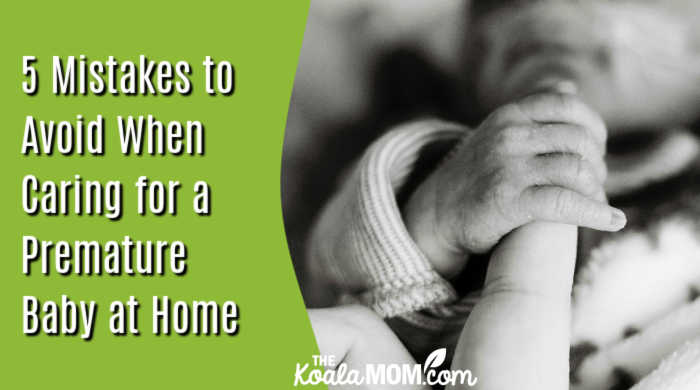Bringing your premature baby home is such a beautiful moment filled with relief and joy. But it is normal to feel a little anxious. After all, preemies require a bit more care and attention than full-term babies.
You can be overwhelmed when you take care of your preemie at home. The reasons can be varied. The constant support from the hospital gets replaced by your instincts and preparations. Many parents have walked this path, balancing caution, love, and learning.
By being aware of some common mistakes and how to avoid them, you can create a safe and nurturing space for your little one. This article discusses five things to avoid when caring for your premature baby at home so you can feel more confident.

#1: Not Having a Consistent Feeding Routine
One of the most common mistakes parents make when caring for a premature baby is not establishing a consistent feeding routine. You might think your little one will give you clear signs when hungry. But preemies can be a bit different. They often don’t show the same unmistakable hunger cues as full-term babies.
KidsHealth states that as your baby is ready for discharge, doctors will have a custom feeding plan designed for them. It may include extra calories to help them grow strong. Premature babies typically need more nutrition to keep up with the growth of full-term infants.
Missing or delaying feeds, even by accident, can lead to issues like low blood sugar, poor weight gain, and dehydration. Sticking to a regular feeding schedule is crucial, even if your baby seems drowsy or uninterested. Don’t hesitate to set alarms and keep track of each feeding to ensure your little one gets enough nutrition.
The tiny tummies need frequent, gentle nourishment to grow strong and healthy. A consistent routine helps spot any feeding problems early. It gives your preemie the best shot at healthy development.
#2: Not Being Mindful About Temperature
A frequent mistake parents make is not being careful about the temperature when looking after a premature baby. Preemies can’t manage their body heat like full-term babies do, so they are sensitive to changes in temperature.
If your baby gets too cold, it can lead to serious issues, while overheating can cause discomfort and heighten the risk of sudden infant death syndrome. Many parents either overdress their little one or don’t provide enough warmth, thinking it’s all good.
Children’s Hospital of Philadelphia notes that premature and low-birthweight babies often have very little body fat. It is difficult for them to regulate their temperature. A drop of one degree from the ideal 97.7 °F (36.5°C) can lead to a 10 percent increase in their oxygen consumption. The right temperature can save energy and build up reserves. This is especially crucial for babies who are sick or born prematurely.
You must keep the room temperature stable and dress your baby in light layers. Skin-to-skin contact is a perfect way to help regulate temperature naturally. Paying attention to this can enhance your baby’s comfort and health.
#3: Overlooking Red Flags of Ill Health
A substantial mistake that many parents make is overlooking the signs of potential health issues in their premature babies. Preemies can get sick fast, and their symptoms can be pretty subtle—like being extra sleepy or showing changes in skin tone. Ignoring these red flags or waiting too long to contact your doctor can put your baby at risk for serious complications.
A pediatric nurse practitioner can be a great help in taking care of your premature baby. Many nurses have attained rich nursing education through pediatric nurse practitioner colleges. The program enhances the nurse’s experience of spiritual, personal, and professional life. They deepen their understanding of what it means to embody faith as a nurse.
Spring Arbor University states that the increasing shortage of pediatric healthcare providers deprives millions of children of access to essential primary care. The program gives the nurses the clinical skills needed to promote the best health outcomes for children through primary care. Hiring these nurses can ease your stress, and your baby can get the best care.
If something feels off, you must check in with your pediatrician or doctor. Keep a close eye on your baby’s behavior, feeding patterns, and appearance. Spotting problems early can make a huge difference, so don’t hesitate to ask for help if you are worried, even if it is nothing.
#4: Trying to Manage Everything Alone
Trying to juggle everything on your own is a common pitfall for many new parents, especially those with premature babies. It’s completely understandable to want to show that you can manage or think that asking for help means you’re falling short. But caring for a preemie is a monumental task, both physically and emotionally.
If you attempt to handle it all solo, exhaustion, stress, and feelings of isolation can creep in pretty quickly. Don’t hesitate to lean on your partner, family, or friends for support. It may include help with chores, meals, or someone to talk to.
You can connect with support groups or professionals who get what you’re experiencing. Accepting help only makes you a stronger and more resilient parent.
#5: Neglecting Self-Care
Taking care of yourself is something many parents of premature babies overlook, and it is a mistake that can take a toll. When you are so focused on your little one’s needs, it’s easy to forget about your health and happiness.
According to Stanford Children’s Health, the postpartum period is filled with a whirlwind of changes. As a new mother, you are navigating the shifts while figuring out how to care for your little one. Taking care of yourself is crucial during this time to regain your strength. Prioritize rest, eat well, and seek help in the first few weeks.
You feel drained if you’re running empty, skipping meals, losing sleep, or neglecting your well-being. It affects your mood and energy and how well you care for your baby. Remember, you can’t pour from an empty cup. Even small breaks, nourishing meals, and rest when you can manage it.
Don’t hesitate to ask someone to watch your baby while you take a quick shower or catch a nap. Focusing on self-care isn’t selfish; it’s essential. When you care for yourself, you are in a much better position to give your preemie the love and attention they need to flourish.
FAQs
What to dress a premature baby in at night?
It’s best to dress your premature baby in soft, breathable layers, like a cozy cotton onesie paired with a light sleep sack. Avoid heavy blankets or loose bedding to ensure they stay safe and comfortable. Skin-to-skin contact can be a wonderful way to keep your little one feeling snug and secure.
When do premature babies start crying?
Premature babies start crying more frequently around two weeks after their original due date. This crying phase usually ramps up and peaks between 6 to 8 weeks. While every baby is unique, this pattern is standard for preemies as they grow and adapt to life outside the hospital.
What precautions should be taken for premature babies?
To keep your premature baby safe, limit outings and avoid crowded places. Restrict visitors and ensure that anyone who carries your baby has clean hands and is well. Stay on top of all recommended vaccinations, including flu and pertussis. Keep a close eye on your baby for any signs of illness.

Caring for a premature baby at home can be quite an adventure, and it comes with its own set of challenges. But by avoiding some common mistakes, you can help your little one thrive. Parenting a preemie is all about learning. Trust your instincts, rely on your support system, and celebrate every milestone, no matter how small. With patience, vigilance, and lots of love, you will give your preemie the best possible start in life.

No Responses Yet